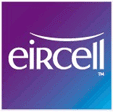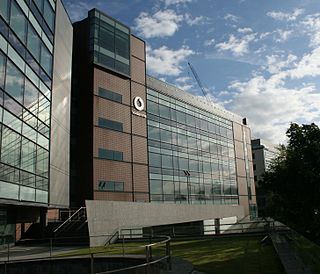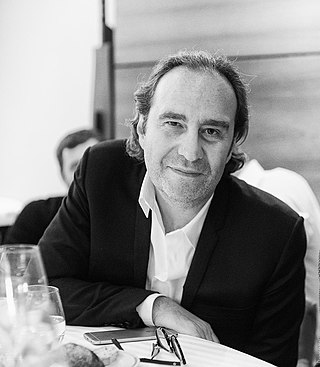Telecommunications in Ireland operate in a regulated competitive market that provides customers with a wide array of advanced digital services. This article explores Ireland's telecommunications infrastructure including: fixed and mobile networks, The voice, data and Internet services, cable television, developments in next generation networks and broadcast networks for radio and television.

Éire is Irish for "Ireland", the name of both an island in the North Atlantic and the sovereign state of the Republic of Ireland which governs 84% of the island's landmass. The latter is distinct from Northern Ireland, which covers the remainder of the northeast of the island. The same name is also sometimes used in English.

Bezeq is an Israeli telecommunications company. Bezeq and its subsidiaries offer a range of telecom services, including fixed-line, mobile telephony, high-speed Internet, transmission, and pay TV.
Telephone slamming is an illegal telecommunications practice, in which a subscriber's telephone service is changed without their consent. Slamming became a more visible issue after the deregulation of the telecommunications industry in the mid-1980s, especially after several price wars between the major telecommunications companies. The term slamming was coined by Mick Ahearn, who was a consumer marketing manager at AT&T in September 1987. The inspiration for the term came from the ease at which a competitor could switch a customer's service away from AT&T by falsely notifying a telephone company that an AT&T customer had elected to switch to their service. This process gave AT&T's competitors a "slam dunk" method for the unauthorized switching of a customer's long-distance service. The term slamming became an industry standard term for this practice.

Eircom Limited, trading as Eir, is a large fixed, mobile and broadband telecommunications company in Ireland. The now privatised company, which is currently incorporated in Jersey, traces its origins to the Ireland's former state-owned monopoly telecommunication provider Telecom Éireann and its predecessors, P&T and before the foundation of the state, the telecommunications division of the GPO. It remains the largest telecommunications operator in Ireland and has overseas operations focused on the business and corporate telecom markets in the United Kingdom. The company was in majority state ownership until 1999, when it was privatised through a floatation on the Irish and New York Stock Exchanges.

Telecom Éireann was an Irish state-owned telecommunications company that operated from 1983 to 1999. Prior to then a telephone and postal service was provided by the Department of Posts and Telegraphs, as part of the civil service. Telecom Éireann was established by the Postal and Telecommunications Services Act, 1983; its full formal title was "Bord Telecom Éireann or, in the English language, The Irish Telecommunications Board". "Telecom Éireann" may be translated as "Telecom of Ireland". In 1999, the company was privatised and renamed as eircom.

Eircell was an Irish mobile cellular network provider which was established in 1984, with operations commencing in 1986. Its access code was 088 for the original analogue TACS system and 087 for the later GSM system. Following the abolition of the Department of Posts and Telegraphs, Eircell fell under the remit of Telecom Éireann, which today is known as Eir. The Eircell brand became defunct in 2002 following its acquisition by Vodafone. From 2001, Eircell underwent a major branding exercise after its acquisition by the Vodafone group in December 2000. The main branding was to associate a shade of deep purple with the company. When Vodafone rebranded with its trademark shade of red, the company commented that "red is the new purple". The company was known as Eircell-Vodafone for some time as the process took nine months in total.
Meteor Mobile Communications Limited was a GSM and UMTS mobile telecommunications company in Ireland. They operated a GSM/GPRS/EDGE/UMTS(HSPA+) and LTE cellular communications network under licence from the Commission for Communications Regulation (ComReg), and were the third entrant in the market, after Vodafone Ireland and Three Ireland. The company was a wholly owned subsidiary of Irish telecoms network Eir, having been purchased for €420m in 2005. Meteor was the only Irish owned mobile operator in Ireland. Meteor once issued new numbers with the prefix code 085. Since the introduction of full mobile number portability in Ireland, access codes have become less relevant as mobile telephone users may now retain their mobile telephone numbers when moving between mobile network operators. As a result, Meteor customers could have numbers starting with the codes 083, 085, 086, 087, or 089.

Vodafone Ireland Limited, a wholly owned subsidiary of the Vodafone Group, is a mobile phone network and broadband provider in Ireland. It was created when the Vodafone Group bought Eircell, the mobile arm of Telecom Éireann. As of September 2019, Vodafone has 26% of broadband subscribers, and 43% of mobile phone subscribers.

BT Communications (Ireland) Limited is a telecommunications and internet company in Ireland. It is a subsidiary of BT Group plc.

Smart Telecom (AIM:SMR) was an Irish telecom operator that started as a phone card seller. It was also the third largest provider of cost-sensitive telecom services sector in Ireland, behind the incumbent operators eircom and BT Ireland. It had an estimated 50,000 land-line customers and 18,000 broadband subscribers. Smart operated several services:
A Publicly-owned company is the name given in Ireland to a state-owned enterprise, that is to say, a commercial business which is beneficially owned, either completely or majority, by the Irish Government. Each state-sponsored body has a sponsor Minister who acts as shareholder, either independently, or in conjunction with the Minister for Finance, who may also be a shareholder. State-sponsored bodies are often popularly called semi-state companies, a misnomer, since they are all (mostly) fully owned by the state, in addition not all of them are actually companies.
Magnet Networks, trading as Magnet Plus, is an Irish company providing telephone and broadband internet services which was launched in Dublin in 2004. Originally owned by the US-based international investment company Columbia Ventures Corporation (CVC), it was acquired in December 2020 by the "Irish investment vehicle" Speed Fibre Group. Speed Fibre Group, itself a subsidiary of the Irish Infrastructure Fund, also owned AirSpeed Telecom and, in 2021, these two companies joined to operate under a combined "Magnet Plus" brand. As of 2020, Magnet Networks reportedly had approximately 100 staff.

NTL Communications (Ireland) Limited was a cable television and Multichannel Multipoint Distribution Service (MMDS) company in Ireland. As of 2005 it was owned by Liberty Global Europe, having been divested by NTL. It was rebranded as UPC Ireland.

Numbers on the Irish telephone numbering plan are regulated and assigned to operators by ComReg.

The internet is an important contributor to Ireland's economy and education. The telecommunications infrastructure in Ireland provides Internet access to businesses and home users in various forms, including fibre, cable, DSL, wireless, Fixed Wireless and mobile. In 2019, 91% of households have access to the Internet in Ireland at home, with 88% of individuals reporting that they had used the internet in the three months prior to interview.
Access to the Internet in Azerbaijan is growing, supported by a national strategy to develop the country into an information and communication technology (ICT) hub for the Caucasus region. The Azerbaijani government actively seeks to attract foreign aid to help boost the telecommunications and ICT sectors. While the government claims 85 percent of the population was online in 2013, service provider Baktelekom has provided free Wi-Fi zones in several points of Baku like the National Flag Square, the Boulevard, Old City, the park around the Heyder Aliyev Centre, parks of Sahil, Sabir, Samad Vurghun, Winter Park, as well as Port Baku Residence and Port Baku Mall.
Internet censorship in Ireland is a controversial issue with the introduction of a graduated response policy in 2008 followed by an effort to block certain file sharing sites starting in February 2009. Beyond these issues there are no government restrictions on access to the Internet or credible reports that the government monitored e-mail or Internet chat rooms. Individuals and groups could engage in the expression of views via the Internet, including by e-mail. Irish law provides for freedom of speech including for members of the press, and the government generally respects these rights in practice. An independent press, an effective judiciary, and a functioning democratic political system act jointly to ensure freedom of speech and of the press.

Xavier Niel is a French billionaire businessman involved in the telecommunications and technology industry. He is best known as founder and majority shareholder of the French Internet service provider and mobile operator Iliad trading under the Free brand. He is also co-owner of the newspaper Le Monde, co-owner of the rights of the song "My Way" and owner of Monaco Telecom, Salt Mobile SA and Eir. He is chairman and chief strategy officer for Iliad, but also a board member of KKR and Unibail-Rodamco-Westfield.
Openet is a software vendor with corporate headquarters in Dublin, Ireland, and two regional headquarters in Malaysia and the United States with offices worldwide. Openet products are used by telecommunications service providers to commercialize and analyze activity on their network by processing customers' data usage. Openet was acquired by Amdocs in 2020.










